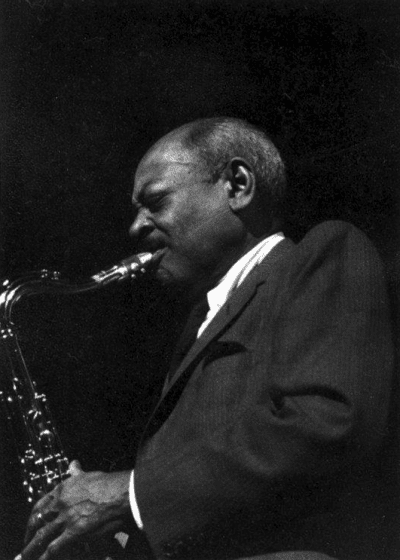.
.
Mallory1180, CC BY-SA 4.0, via Wikimedia Commons

Coleman Hawkins; Brussels, 1964
.
___
.
Coleman Hawkins to W.B. Yeats
And what rough beast, its hour come round at last…?
WB Yeats, The Second Coming
Listen, people. Hear time’s timeless solos, listen
To the whirling gulls, to the keening choruses of dream
That take you where the mind can only barely fasten
To the flotsam of your long-forgotten theme.
Our lives describe a winding arc of chiral time
Where the wide world’s axis wobbles uncontrolled
To an unsung music somehow always yet to come,
Since never was the center meant to hold.
Our bodies gyre among the centri-fugal solid things,
We products of the hub-less wheel of change, yet we,
The souls of vanished worlds and undiscovered songs,
Like anxious fowlers on the heath await the silver peal,
The savage gimlet glare, the prodigal’s defiant cry
That spurns the falconer and every fancied center of the Real.
.
___
.
Whistling On The Stair
Exercised in the still night, when only the moon rages
Dylan Thomas
1.
In my teens, paradise
……………was a resonant stairwell
………………………….that no one ever used,
or a stone portico sometimes,
……………where I could whistle
………………………….to my heart’s content
my favorite melodies, the syncopations
……………of some samba
………………………….or canon or fugue,
where the sostenuto let me hear,
……………or so at least I thought,
………………………….maybe two notes at a time,
a quasi-chordal confluence,
……………the almost-contrapuntals
………………………….that only I might fully appreciate.
I told myself I enjoyed
……………the sheer privacy of it,
………………………….the absence of an audience,
but I think I secretly imagined
……………someone happening by,
………………………….arrested by an ethereal beauty,
thrilled as I was
……………by the miraculous,
………………………….prodigal noise I made.
2.
In my twenties I tended bar,
……………but my dream job,
………………………….conjured as I polished the glassware
or started closing down
……………after a long night
………………………….with all those maudlin drunks
and hustlers, was to be a midnight
……………disk jockey at some derelict station,
………………………….like Johnny Fever on WKRP,
playing music to which
……………no one was ever listening,
………………………….the music I alone wished to hear:
Lester Young, perhaps,
……………or Roswell Rudd or Coleman Hawkins,
………………………….Otis Redding, Billie, Albert Ayler,
Cecil Taylor, Ornette or Monk,
……………sending it all down a one-way street,
………………………….into the vacant ether.
But I think I secretly imagined then
……………that maybe just one scant
………………………….someone might happen
on my lonesome mix
……………in the still night and think, oh man,
………………………….this little gray can really spin it.
3.
Now, in twilight, after long hiatus,
……………as fumbling practitioner
………………………….in that “craft or sullen art”
of which the wild Welshman sang,
……………I can only be as forearmed
………………………….as he once forewarned,
expecting neither “praise nor wages,”
……………and wanting none. And yet,
………………………….and yet, I sometimes wonder
if I’m being quite honest
……………with myself, wonder if perhaps
………………………….the accidental well-turned verse
or happy image or lapidary particle
……………of timeless wisdom
………………………….got at the usurious cost
of countless contusions and confusions
……………might give the lie to my smug solipsism,
………………………….might just be calling shyly out
for some anonymous reply,
……………listening for at least an echo,
………………………….for I am still, after the passing
of so many decades, the passage
……………of so many successive lives, still
………………………….just whistling on the stair.
.
.
___
.
.
DB Jonas is an orchardist living in the Sangre de Cristo mountains of northern New Mexico. Born in California in 1951, he was raised in Japan and Mexico. After several Wanderjahre in Spain, France and Italy, he studied philosophy and literature at the Universities of California and Padova, and earned postgraduate degrees at Princeton and Yale. Following his retirement from a long career in business and the sciences, he returned to the practice of poetry. His work has recently appeared in Tar River, Blue Unicorn, Whistling Shade, Neologism, Consilience Journal, Poetica Magazine, The Ekphrastic Review, Innisfree Poetry Journal, The Decadent Review, The Amphibian, Willows Wept, Sequoia Speaks; Revue {R}évolution and others.
.
.
Listen to the 1960 recording of Coleman Hawkins playing “At Dawning,” with Tommy Flanagan (piano); Wendell Marshall (bass); and Osie Johnson (drums). [Universal Music Group]
.
.
___
.
.
Click here to learn how to submit your poetry
Click here to subscribe to the Jerry Jazz Musician quarterly newsletter
.
.
.




























